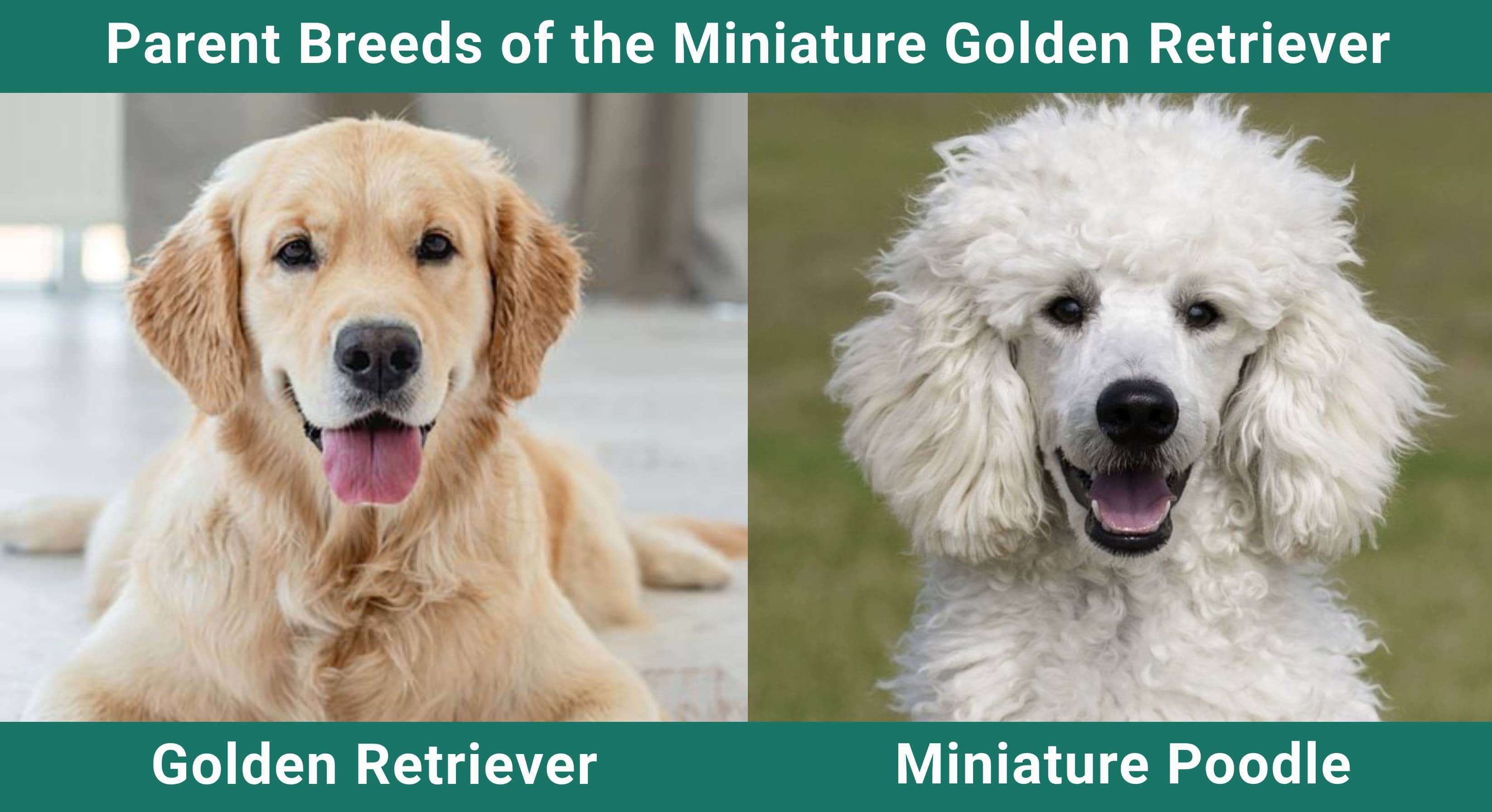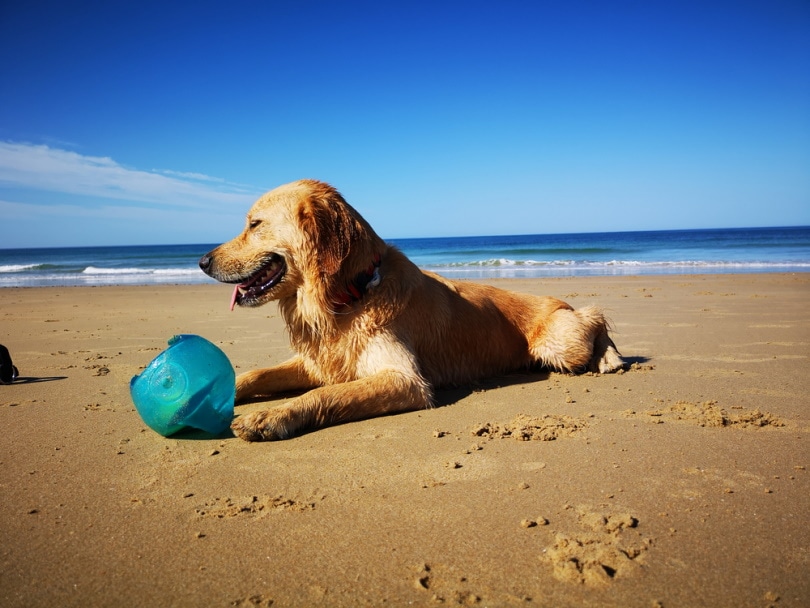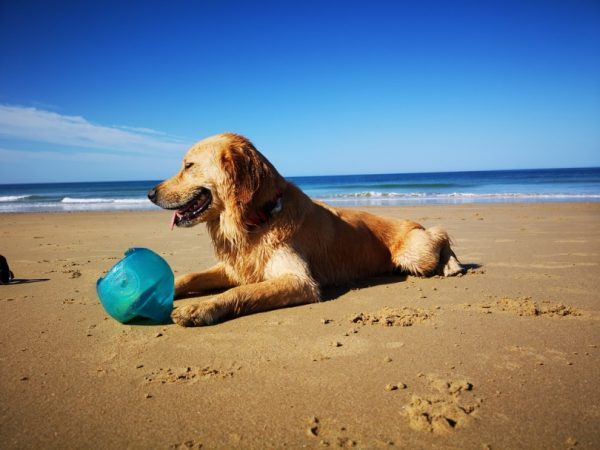Click Below to Skip Ahead
It’s easy to see why Golden Retrievers are one of the most popular dog breeds around. Universally loved for their peaceful natures, faithful devotion, and gentle playfulness, Goldens are a wonderful choice for most households.
Breed Overview
Height:
14 – 20 inches
Weight:
20 – 45 pounds
Lifespan:
12 – 14 years
Colors:
Light cream, gold, tan, deep rust
Suitable for:
Active families with children, apartment dwellers, and those who prefer a smaller dog
Temperament:
Social, playful, intelligent, loyal, eager to please, great with other pets, loving and affectionate with its owners
What if you could find all the qualities of a Golden Retriever in a dog that is healthier, smarter, and sheds less, all wrapped up into an apartment-friendly size? Meet the adorable Miniature Golden Retriever. This darling hybrid has been bred to provide everything its full-sized relative offers but in a smaller package.
In this post, we’ll break down everything you need to know about these fun-sized puppers. Read on to find out all the details on Mini Goldens, including how best to groom, feed, train, and exercise these adorable furry friends.

Miniature Golden Retriever Puppies
Miniature Golden Retriever puppies are most often a cross between three breeds: the Golden Retriever, the Poodle, and the Cocker Spaniel. The best Mini Goldens provide all the fun-loving personality of the Retriever coupled with the Poodle’s super smarts and the happy disposition of the Cocker Spaniel. However, with puppies costing up to several thousand a piece, you must do your research to understand what exactly you are buying.
Given that the Miniature Golden Retriever is a mixed-breed dog, these dogs will display a wider variety of traits in their health, shedding, coloring, temperament, and behaviors. Each puppy will be a combination of characteristics found in all three breeds. Reputable breeders try to maximize the amount of Golden Retriever in the mix, aiming for 50% to 75% Retriever lineage to maintain that Goldie feel.
This combination of Golden Retriever, Poodle, and Cocker Spaniel creates a dog that is affectionate, intelligent, playful, kind, social, sheds less, and is easy to train. With a mix of three wonderful breeds in play, it is easy to see how the Miniature Golden Retriever has the potential to be the ultimate family pet.

Temperament & Intelligence of the Miniature Golden Retriever
These dogs are a delight. They love their people and get along wonderfully with other dogs. Each of the three breeds that go into the Miniature Golden Retriever are working dogs. This means they are trainable, intelligent, and motivated to learn.
However, with all that intelligence, they can occasionally be a little rambunctious. They may jump up in excitement, run around, or get a case of the “zoomies”. Because they are a miniature breed, this is not as much of a problem as with a full-sized dog. The best approach with a higher energy dog is to exercise it and train it enough. A dog with purpose is a happy dog.
Miniature Golden Retrievers are more likely to wag their tail and give their paw than bark or bare their teeth. This is not a good guard dog! This is a dog that wants to please, wants to show love, and give love.
It’s important to note that, because there is no breed standard for Miniature Golden Retrievers, it’s possible other breeds may be in the mix. Do your homework. Certain other small dogs such as Pomeranians and Chihuahuas can be more temperamental or more inclined to growl and nip. If your dog has genetic material from these other breeds, it will display some of their traits.
Are These Dogs Good for Families?
This really is the ideal family pet. The Miniature Golden Retriever has a heart that just wants to love and a willingness to be anybody’s friend. They show fortitude and patience with little children and delight in attention and cuddles from their owners.
Usually being descended from three working breeds, they are a higher energy dog and deserve an active family who will put them through their paces. That being said, their smaller size means they are suitable for apartment living and their shorter legs cut down on the distance it takes to tire them out.
Remember, your dog will be clever and that can sometimes mean they see themselves as the pack leader. If your Miniature Golden Retriever displays dominant traits such as nipping, stealing food, or ignoring commands, seek guidance around further training and make sure to supervise your dog when interacting with children. Socializing your pup from a young age is the best way to get a head start on training.
Does This Breed Get Along with Other Pets?
Miniature Golden Retrievers are fluffy sweethearts and are super accepting of just about any dog or other pet in the home. This breed is rarely jealous, moody, or aggressive.
Most dogs do have some chase instinct, so as you introduce your dog to other pets, particularly smaller animals, watch carefully and intervene if necessary. Once good behavior has been baselined, you can trust a Miniature Golden Retriever to interact safely with cats, rabbits, and other pets.
It’s always a good idea to socialize your dog while it is a puppy to ensure that it is used to interacting with pets of all shapes and sizes. Doing this makes certain that you can always take your dog to the dog park or out in public without worrying about bad behavior.
Things to Know When Owning a Miniature Golden Retriever:
With their friendliness, kindness, and intelligence, these adorable balls of fluff are a match for many lifestyles. Nevertheless, it’s important to consider all aspects of a dog—including their diet, long-term health, and grooming needs—before bringing them home.
Food & Diet Requirements
These dogs may be little, but they sure can run. To fuel their fire, they need adequate, well-balanced nutrition. A sensible high protein, high fat, high fiber diet is a must to keep them lean and keen. However, they are not a breed that requires specialty dog food. Most high-quality small breed dog foods are sufficient.
When feeding, there are helpful formulas to help you calculate exactly what your dog needs to stay fit and strong. Beyond that, don’t hesitate to ask your breeder or vet to make a recommendation if you are unsure of what or how much to feed your dog.
While you will most likely find that your dog is not too picky about food and has a big appetite, remember to also factor in treats. Rewarding positive behaviors with healthy snacks is a great way to bond with your dog and reinforce training, but don’t forget to balance their caloric value with what your dog is getting the rest of the day.
Exercise
Miniature Golden Retrievers are up for every adventure. Your dog will always be pleased to spend some time outside on the leash. If possible, alongside your 30-minute twice-daily walks, provide an enclosed outdoor space. This allows them to top up their leash time with solitary play. Although this is an affectionate breed that loves to be with people, they are also content to spend time alone, running around a yard or garden and investigating the outside world on their own.
Indoor play can be just as much fun. With their retriever lineage, most Miniature Golden Retrievers can be taught to fetch. This is a wonderful form of exercise for apartment dwellers or on rainy days.
Training
With their working dog pedigree, it’s easy to see why Miniature Golden Retrievers are so obedient. Beginning while your puppy is young, introduce age-appropriate obedience and house training. You should see your dog respond intelligently and quickly, with just a little patience and positive reinforcement from you. The greater the Golden Retriever component in your dog’s mix, the easier your dog will be to train. Almost all Miniature Golden Retrievers will easily learn basic commands such as sit and stay.
Grooming ✂️
Grooming is a breeze with a Miniature Golden Retriever. Their Poodle parentage means their hair is less prone to shedding, but unlike the Poodle, they don’t need to be maintained with elaborate cuts and styles. Obviously as a lighter-colored dog, mud and dirt will show against their fur. But for urban dogs, you can generally just bathe your pet when necessary—at most once every 6 weeks or so. Overbathing can strip your Mini Golden’s coat of essential oils, so avoid too many bathtub soaks.
Otherwise, pay periodic attention to your pet’s teeth, ears, and nails, as you would any other dog. Brush your dog’s teeth once a week to keep them healthy, clean, and to avoid the bad breath that is a sign of overactive bacteria brought on by a buildup of plaque. You can gently clean out your dog’s ears once a month and you should also keep their claws trimmed and comfortably short.
Health and Conditions
Many mixed breed dogs have a reputation of being healthier and the Miniature Golden Retriever is no exception. All three of their parent lineages—Golden Retriever, Poodle, and Cocker Spaniel—tend to have large, healthy dog populations without some of the inbreeding and resultant genetic issues that may affect other dogs.
This is not a breed you need to worry about, generally speaking. Stay on top of normal health issues such as obesity, bites and ticks, skin infections, ear infections, and joint pain. Give your pet enough attention, activity, and good food and you will have a loving companion for many years.
Here are some problems that can crop up in Golden Retrievers, Poodles, and Cocker Spaniels. Knowing what conditions are found in these breeds is an easy way to predict the issues that may affect a hybrid dog.
- Cataracts
- Ear infections
- Skin infections
- Diabetes
- Hip dysplasia
- Arthritis and joint pain
Male vs Female
There aren’t any significant differences between male and female Miniature Golden Retrievers. As with most breeds, male dogs can be slightly larger. Males may also be slightly cheaper to buy, as females can be more popular. Every dog has a unique personality, and just like with humans, they are affected by their natures and the nurture they receive from puppyhood. Their treatment and handling have much more of an impact on their temperament than their gender.
3 Little-Known Facts About the Miniature Golden Retriever
1. Miniature Golden Retrievers Are a 21st Century Dog
Kathy Burgess was one of the first people to create the Miniature Golden Retriever. A prize-winning breeder of full-sized Goldens, she set out to miniaturize the breed and registered the trademark “Comfort Retrievers” in 2003.
2. “Miniature Golden Retriever” Can Mean Many Things
Because there isn’t a standardized breeding program for Miniature Golden Retrievers, the term can be applied to vastly different dogs. Everything from a smaller purebred Golden Retriever to a Goldendoodle to a breed mixed with Chihuahuas may be termed a Miniature Golden Retriever. Most of the time, when the puppies are sold, they all look very similar to a Golden Retriever. As the dog matures, the traits of the other breeds mixed in may come out. This means you’ll need to be scrupulous when choosing a breeder if you want the more traditional Retriever-Poodle-Spaniel mix.
3. The Curlier the Coat, the Less They Shed
Each Miniature Golden Retriever will have variations in the texture of its coat, depending on its parentage. The Miniature Golden Retriever gets its reduced shedding from its Poodle lineage. If a low-shedding dog is important to you, the tighter the curl pattern the better. Wavy- or straight-haired Miniature Golden Retrievers tend to shed more.
Final Thoughts
While Miniature Golden Retrievers are still an evolving breed, they are undoubtedly adorable. This small, lower-maintenance dog is big in personality and even bigger in heart. Remember to ask your breeder about the lineage of your puppy so you can make sure you understand what you are paying for. A mix of Golden Retriever, Poodle, and Cocker Spaniel is ideal and results in a dog that is a wonderful choice for most homes. You can introduce this dog to small children, other pets, and strangers with the confidence that they will be friendly and kind.
With a Mini Golden, you can look forward to a lifetime of play, adventures, and snuggles.
Featured Image Credit: Vickyflust, Shutterstock









